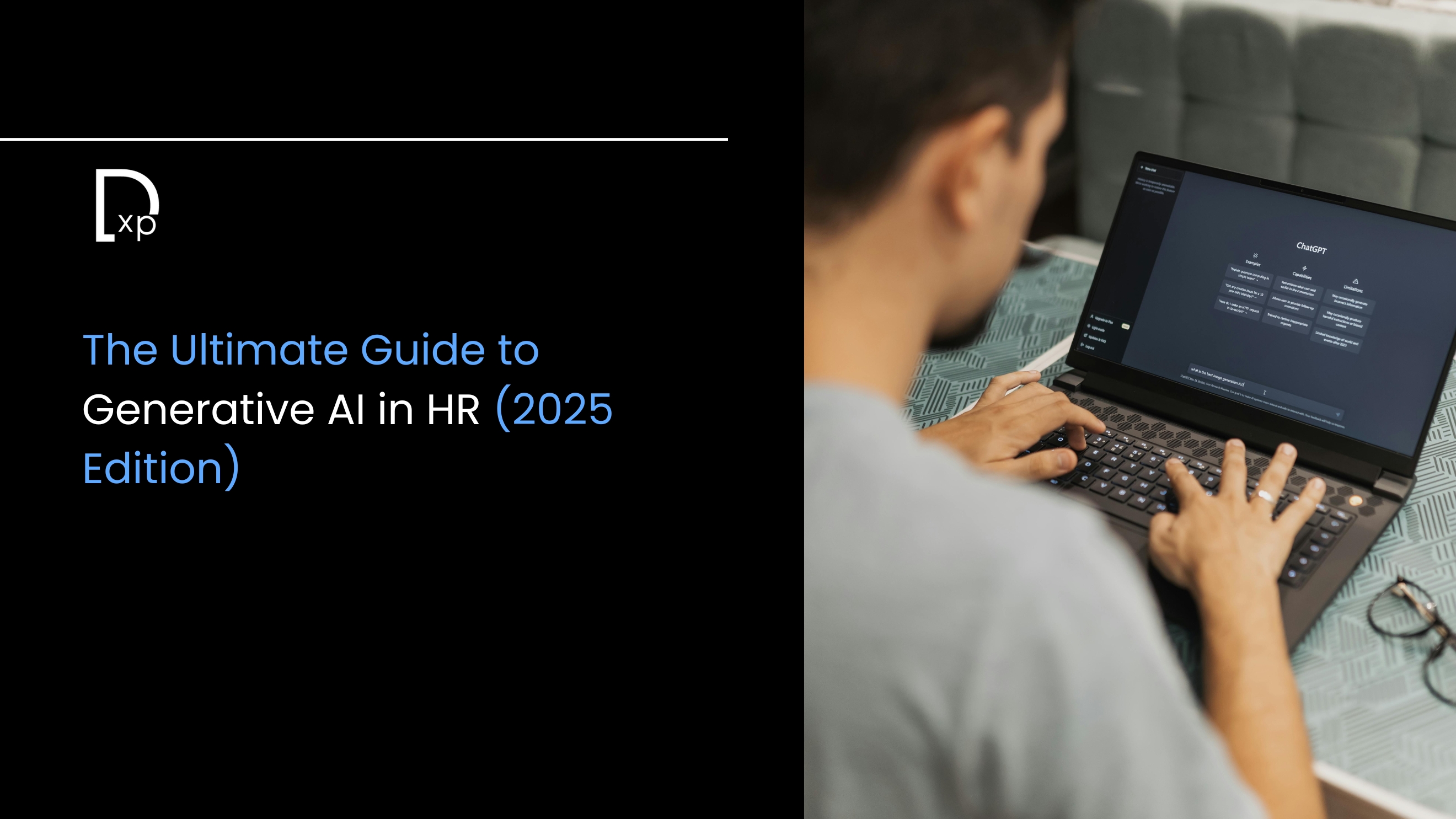The Ultimate Guide to Generative AI in HR (2025 Edition)

In 2025, generative AI in HR is no longer a concept reserved for future-forward thinkers; it is the core of every high-performing human resources strategy. Whether you're a CHRO at a scaling startup, a seasoned HR business partner at an enterprise, or the founder of a tech-first HR consultancy, the reality is the same: the world of people operations has been rewritten by generative AI. The leaders who embrace this shift will dominate recruitment, retention, and talent strategy. Those who don't will fall behind faster than they can spell "automation."
What Generative AI in HR Actually Means in 2025
Let’s clear up the confusion. Generative AI in HR isn’t just ChatGPT writing job descriptions. It’s a full-scale evolution in how HR delivers business value. We’re talking smart systems that generate employee engagement strategies tailored by individual psychometrics, AI-driven internal mobility models that rewrite workforce planning, and predictive algorithms that flag potential attrition long before it happens, not based on guesswork, but on thousands of data points parsed in seconds.
Today, generative AI in HR integrates across all core HR functions. From talent acquisition and onboarding to L&D, performance management, and even DEI initiatives, these models are doing what used to take HR teams months in hours. But here's the catch: it only works if you're intentional. Plug-and-play won’t cut it. You need strategic implementation, contextual understanding, and ethical guardrails.
How Generative AI in HR is Reshaping Recruitment
Ask any recruiter about their biggest bottleneck, and they’ll likely say sourcing or screening. Generative AI is fixing both. In 2025, top TA teams aren’t just automating job descriptions; they’re using AI to reverse-engineer ideal candidate profiles, map talent availability by region, and even simulate potential candidate responses to gauge alignment before a conversation happens.
This shift doesn’t replace recruiters. It elevates them. It frees up time for real conversations, cultural assessments, and strategic hiring decisions. With generative AI in HR, recruitment becomes a precision tool rather than a scattershot effort. And for companies hiring at scale, this shift is a game-changer.
Personalized Employee Experience is the New Standard
One-size-fits-all HR programs are officially dead. If you're still running static onboarding decks or sending generic surveys, you’ve already lost the attention of your talent. Generative AI in HR now enables personalization at scale. Onboarding content changes dynamically based on role, seniority, learning style, and location. Career development paths are crafted in real-time using employee skill gaps, aspirations, and business needs.
This matters. Not because personalization is trendy, but because it's profitable. Personalized experiences drive retention, performance, and internal mobility. When people feel seen and supported, they stay. Generative AI in HR gives your team the ability to deliver that level of tailored support without adding headcount or burning out HR professionals.
Performance Management is Now a Living, Breathing System
Forget annual reviews. Generative AI in HR is powering real-time, always-on performance feedback loops. Managers receive nudges to deliver recognition or coaching at optimal moments. Employees get actionable, bite-sized feedback on their goals, not months after the fact but when it matters. And the best part? These systems learn. They recognize patterns, biases, and blind spots over time, creating a fairer and equitable performance culture.
This isn’t theoretical. High-growth companies in 2025 are already replacing old performance models with these adaptive systems. The result? Higher engagement, clearer accountability, and data-driven promotion decisions that employees trust.
Learning and Development is Now a Continuous Flow
In the old HR model, L&D meant dusty LMS platforms and mandatory quarterly webinars. In today’s world, generative AI in HR has made learning dynamic, contextual, and on-demand. Imagine an employee who just got promoted to team lead. Instead of assigning a static management course, AI curates a personalized leadership journey, complete with micro-learning modules, mentor match recommendations, and real-time skill assessments.
The impact is huge. Employees grow faster. Leaders emerge earlier. And the business stays ahead of the curve. For companies navigating rapid change or digital transformation, this isn't a nice-to-have; it's the edge.
Ethical and Responsible Use of Generative AI in HR
Of course, no discussion on generative AI in HR would be complete without addressing ethics. Because with great power comes great risk. Algorithmic bias, data privacy, and transparency are real concerns, and smart HR leaders are proactively addressing them. This means auditing models, using explainable AI, and involving cross-functional teams in every implementation.
Trust is the currency of HR. If employees feel like they’re being watched, not supported, AI becomes a liability. The companies that will win in 2025 are those that use generative AI to enhance the human experience, not to replace it. And that requires a strong ethical backbone.
Future-Proofing Your HR Strategy With Generative AI
The companies that are scaling in 2025 all have one thing in common, they’ve made generative AI in HR a strategic priority, not a side experiment. They aren’t chasing the shiny tools; they’re building capability. That means investing in AI literacy for HR teams, partnering with IT and data science, and measuring success beyond vanity metrics.
This is your moment. Whether you’re leading a global HR function or building people ops from scratch, the question isn’t if you should adopt generative AI in HR; it’s how fast you can make it core to your strategy. The future is here. And it’s being shaped by the decisions you make today.




